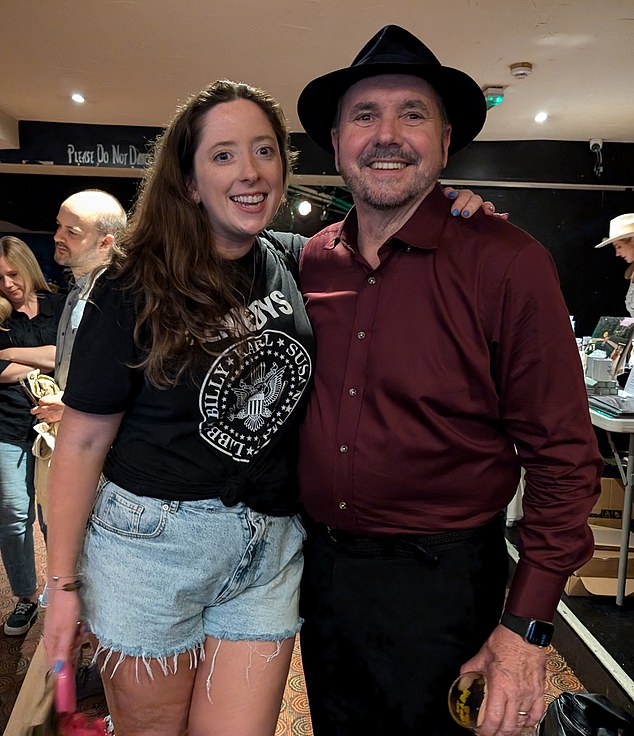Scrolling through her online application for weight-loss jabs, Lauren Malone came to the section she had dreaded: Have you ever been diagnosed with an eating disorder?
The answer was a resounding yes – bulimia, a condition which had plagued her since the age of 11.
However, believing she would otherwise be turned down for Mounjaro by the private pharmacy, Lauren, 39, who has been in recovery for six years, clicked ‘No’.
‘I felt guilty about lying but also sure they wouldn’t prescribe it, if I was honest. Otherwise why ask the question?’ says the mother of two from the Forest of Dean, Gloucestershire. ‘They also asked whether I wanted them to contact my GP and I said “No”, that way I knew they couldn’t access my medical records, showing my history of an eating disorder.’
Lauren certainly isn’t the only person to lie in order to access Mounjaro and other so called ‘fat jabs’.
Earlier this year, UK charities supporting people with eating disorders expressed concern about those accessing GLP-1 drugs simply by lying about their BMI – claiming falsely to be overweight – on application forms.
Understandably, Lauren’s husband, Luke, was anxious about his wife’s actions. He had supported her through her eating disorder and recovery and was worried Mounjaro might trigger a relapse. However, having shed 3st 6lbs in six months thanks to the injections and going from a dress size 18 to a size 10, Lauren feels vindicated in her decision.
With her starting weight of 15st 1lb reduced to 11st 9lbs, Mounjaro has steered her towards healthier eating and exercise habits, and significantly reduced her risk of diabetes, heart disease and cancer. But Lauren can’t shake one niggling fear.

Lauren Malone weighed 15st 1lb before she started taking Mounjaro – after lying about her battle with bulimia to qualify for the drugs

After six months on weight-loss jabs, Lauren got her weight down to 11st 9lbs
What if, after stopping the drugs, she regains the weight? Studies show that, within a year, most users put on two-thirds of what they have lost. Would, in her desperation, she be at risk of falling back into old habits of bingeing and purging?
With just another 10lbs to lose before hitting her target, to mitigate this risk, Lauren plans to keep jabbing for another six months to ensure her new-found healthy eating and exercise habits are well ingrained.
‘I’m not sure you can ever be fully free of an eating disorder, so I’m right to be concerned,’ she says. ‘Over the past six months, thanks to Mounjaro, I’ve learnt to eat mindfully and really enjoy what food I have, albeit in much smaller portions, and now I barely think about food.
‘However, I also know that, if you’ve been bulimic before, you can be easily triggered into it again.
‘So I want to make sure that healthy eating, portion control and exercise are second nature for me, before I stop using the jabs. I never want to have an eating disorder again.
‘If I thought I was heading that way, I’d definitely seek support, through therapy, which is what finally helped me to recover.’
Lauren is currently on a 10mg dose, having gradually built up from an initial 2.5mg, and her plan is to taper back down, via 7.5mg and 5mg doses, before eventually quitting.
With the cost of the drug, via an online pharmacy, averaging £200 a month, Lauren, who runs a coaching business, has so far spent £1,200 on Mounjaro but now, thanks to recent price rises, is considering switching to the more affordable Wegovy.

Lauren with her husband Luke. She wanted to be transparent about her bulimia so she told Luke about her eating disorder early in their relationship

Lauren says her body image issues began when she was on a school trip aged 11 and one of her classmates told her she was overweight

The mother of two says she is ‘so much more confident since losing weight’ and the weight-loss jabs have been ‘worth every penny’
‘I’ve heard the difference is minimal, and I’ve achieved so much already, so I wouldn’t mind,’ says Lauren. ‘Also, whichever brand I use, my health coach has told me the weight loss will be slower, now that I’ve less to lose.’
The prescription comes with health coaching, which includes advice and support around what to eat and how to exercise to maintain and build muscle, which she has found ‘invaluable’ in changing her mindset around food.
Given her physical transformation and the health benefits, Lauren believes it has been ‘worth every penny’.
‘I am so much more confident since losing weight,’ she says. ‘I used to live in baggy hoodies and tracksuit bottoms, anything to hide my body, whereas now I’m wearing cute dresses, shorts, even crop tops, which I’d never have felt comfortable in before.’
Her relief at having achieved this through healthy eating and exercise, albeit with the aid of a drug, is evident, as Lauren’s issues with food and weight date back to childhood.
It was on a skiing trip to Austria with her school aged 11 that she began purging.
After a day on the slopes, Lauren returned to the chalet feeling ravenous and helped herself to a second portion of chips.
‘One of the boys said: “You’re gonna get so fat, you’re really fat already”,’ she recalls. ‘His words had such an impact on me – I felt deeply ashamed – that I went back to my room and made myself sick. I can see now, looking back at photographs, I wasn’t fat, just an average-sized girl.’
Purging became a habit Lauren would resort to over the next 22 years, going from an occasional thing to a daily ritual. Her weight fluctuated between a skeletal 7st, in her mid-teens, to 15st by her 30s.
‘It’s a myth bulimics are always skinny,’ she says. ‘I tried starving myself all day at school but the hunger was so great I’d end up bingeing on a whole loaf of bread, once I got home, then purging.’
In sixth form, a classmate overheard Lauren being sick in a toilet cubicle and told their A-level psychology teacher who spoke to Lauren about it.
‘I admitted I was making myself sick and she explained it was bad for me and my body,’ recalls Lauren. ‘I told her I’d stop, but of course I didn’t. I don’t remember anyone else, even my parents, ever mentioning it to me.’ But, by then, Lauren had become expert at hiding her habit. She learnt how to vomit quietly and would always immediately brush her teeth to get rid of the smell.
At that stage, Lauren was making herself sick after everything she ate. It gave her a sense of control.
When her weight dropped to 7st, friends remarked on how ‘skinny’ she looked, though, even then, she didn’t believe them.
By her mid-20s, while working as a restaurant manager, Lauren was feeling rundown, tired and susceptible to every cold virus, so she made an appointment with her GP.
When the doctor asked about her eating habits, she answered honestly, and was diagnosed with bulimia.
‘I’d known I was bulimic for years and didn’t really think it was a problem, which seems crazy now,’ says Lauren. ‘I realised it was, when she told me the vomiting could leave me with very low potassium levels, which can lead to serious heart and kidney problems, so I would need to have regular blood tests.
‘She also asked whether, if I had children, I would want them to be suffering like I was. It really struck a chord, because I knew, instantly, that I wouldn’t.’
Mercifully, Lauren never reached such dangerously low levels; however she did experience dental problems, as the acid in the vomit had worn down the enamel on her teeth, and has since spent around £2,000 on repairs.
Over the next three years, Lauren underwent Cognitive Behavioural Therapy (CBT), through the NHS, though she didn’t find it especially helpful, continuing to overeat and purge throughout.
The weigh-ins before each session were especially stressful.
‘My weight went up and down, though never below 12st,’ she says. ‘It was humiliating standing on the scales. Ridiculous though this may sound, it made me feel I was failing at bulimia, because I wasn’t thin.’
Lauren was 28 and in the midst of CBT treatment when she met Luke, 36, who runs an accountancy business and has always been naturally slim, in a local pub, in 2014.
Within a week of dating, sensing they had a future together, she confided in him about her eating disorder, conscious it would otherwise be difficult for them to get close.
He seemed surprised at her candidness, she recalls, but went off to do some reading about the condition.
‘I felt strongly that being honest with him was important but also remember saying: “Let’s not make a big deal of it, because if you try to control me, or stop me from going to the loo after we’ve eaten, it’s just going to escalate.”‘
Luke’s research convinced him he would not be able to influence Lauren’s behaviour around food and that his role was to remind her, through words and actions, that she was loved.
And so, for the next five years, during which Lauren continued to binge and purge, that is what he did.
‘He makes a point of telling me that my size doesn’t impact how he feels about me,’ says Lauren. ‘Although I’m happier slimmer it’s important for me to know Luke doesn’t love me any more or less, because I’ve lost weight, that, for him, it’s about the person inside the body.’
Before their wedding in 2018 Lauren lost 3st following the Slimming World diet and was able to get her bulimia under control.
However, once off the diet, she quickly regained the weight, prompting a major relapse.
With the benefit of hindsight, Lauren believes this is the reason the newlyweds initially struggled to conceive, as her body wasn’t healthy enough to carry a baby.
It was in 2019, while doing a course in Neuro-linguistic Programming (NLP), which she uses in her coaching practice, that Lauren had a breakthrough that finally led to her recovery.
The trainer talked about people describing themselves as ‘being depressed’ rather than saying they are ‘feeling depressed’, and how this over-identification with a condition can get in the way of recovery.
During a tea break, Lauren told the trainer she was interested in these distinctions, given she had always considered herself ‘bulimic’.
‘He asked me: “When are you not bulimic?” and I realised, as I didn’t actually spend much of my day purging, and did many other things too, that it was most of the time,’ she says. ‘Something switched in my brain, in that moment.
‘Later, a group of us went for a meal. Afterwards I automatically headed to the loo, intending to make myself sick. In the cubicle I remember thinking I was at a crossroads and could either vomit or resist the urge – which is what I did – walk out and live my life, no longer at the mercy of an eating disorder.’
Six years later, with the help of more therapy, Lauren is still free of bulimia.
While the impulse to purge, inevitably perhaps, would creep into Lauren’s head, particularly after a big meal, since that day, it has never overwhelmed her.
Within a couple of months of doing the training, she was delighted to find herself pregnant with their son, Oak, five. Daughter, Hero, three, followed two years later.
However, struggling to lose weight after Hero’s birth, Lauren was conscious that, at 15st and 5ft 6ins tall, she was medically obese, a condition that comes with its own significant health risks.
Keen to be fit for as long as possible, for her children’s sake, she rediscovered her childhood passion for ballet two years ago and became increasingly aware that everything would be easier if she slimmed down.
So, in March, having been bombarded with adverts for Mounjaro on Facebook, and after doing research into the risks and benefits, Lauren ordered her first dose.
She has been fortunate not to suffer any side-effects and found her appetite reduced immediately. She lost 5lbs in the first week, 1st 4lbs within a month, and has shed a further 2st 2lbs in the five months since.
‘For the first time in my life, I can sense, physically, when I’m full and find it easy to just stop eating,’ she says. ‘I’ve always skipped breakfast, have scrambled eggs for lunch and then eat dinner – cottage pie, spaghetti Bolognese or chicken wraps – with the family in the evenings, but have half the portion size I used to.
‘We no longer have takeaways and, when I fancy something sweet, I’m satisfied with a small, rather than a family-sized, bar of chocolate.’
Meal planning and eating more protein and salad, which leave her feeling satiated, but not over-full, have also helped. The challenge will be managing her relationship with food without the jabs.
Lauren is cautiously optimistic, while aware that, given her history, there is always a risk of relapse. If she regains weight she will, therefore, apply to go back on the jabs and ‘probably wouldn’t mention the bulimia’.
‘Relapse wouldn’t just be a huge setback from a physical point of view; it would greatly impact my mental health, too.
‘I can’t rule it out. I’m taking a drug to help me lose weight, so it would feel hypocritical to claim I now have a completely healthy relationship with food.
‘But I’m definitely on the right path and will do everything within my power to stay on it.’
Additional reporting: Matthew Barbour
Expert view
Dr Joanna Silver, a counselling psychologist and lead therapist at Orri, a specialist eating disorder centre in London, says:
With a starting BMI in the middle of the obese category, Lauren met the criteria for weight-loss jabs.
Some people with a history of eating disorders are being prescribed this medication, but may require more support.
Had she mentioned bulimia, the health coach might have focused more on avoiding relapsing into old habits.
The drug is very good at reducing weight and appetite, but it’s not necessarily going to work on healing someone’s relationship with food.
When Lauren stops using the jabs and her appetite returns, it may trigger similar feelings of being out of control which have, in the past, led to bingeing and purging.
For this reason, I would recommend anyone with a history of EDs being honest and getting appropriate medical support in managing both going on and coming off weight-loss medication.
Additionally, it’s never recommended for those with restricting eating disorders, such as anorexia.












